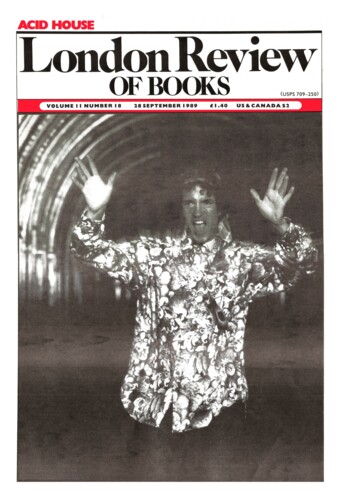Colin McGinn
Colin McGinn a reader in philosophy at University College London, is soon to take up the position of Wilde Reader in Mental Philosophy at Oxford. He is the author of Wittgenstein on Meaning.
Old Scores
Colin McGinn, 30 August 1990
When I was a quivering graduate student at Oxford in 1973, fresh from the Northern provinces, I sat for the John Locke Prize, a voluntary two-day examination for Oxford postgraduates in philosophy. As I had hitherto been a psychology student at Manchester, I thought this would be good practice for my upcoming B.Phil. philosophy exams. It was quite an ordeal (I nearly gave up at one point), and afterwards I felt I had a long way to go philosophically. A few days later Professor Ayer, who was one of the examiners, informed me that he had been obliged to require that my papers be typed, on account of their extreme illegibility: I would have to dictate them to a typist in the presence of an invigilator, both of whom I would have to pay. I apologised to him for my calligraphic delinquency and expressed some mumbled misgivings about going to all that trouble and expense, in view of my poor performance. To my surprise, he said he thought I was ‘worth it’, on what basis I am not sure. I therefore did as I was told, spending a couple of wincing days reading out my script to be converted into cold type. I really must improve my handwriting, I thought.
Homage to Education
Colin McGinn, 16 August 1990
Robin Collingwood (1889-1943) was born 17 years after Bertrand Russell and died 27 years before him. Given the style and content of Collingwood’s philosophical work, this fact ought to seem surprising. For there is no apparent mark of Russell’s influence, nor of those who influenced him, upon Collingwood’s own philosophical corpus. For better or worse, he stands apart – even aloof – from the British analytical tradition exemplified by Russell. Or perhaps for better and worse: better, because he thereby created a distinctive style of philosophy, in which history, not science (or formal logic), was the model and focus of interest; worse, because his own thought lacks some of the clarity and rigour and analytical depth of the ‘school’ he opposed, or ignored. Not for him the dry deductions of Russell’s Principia Mathematica: consciousness in history was what excited his interest.’
Reputation
Colin McGinn, 23 November 1989
Philosophical reputations come and go – they surge and gutter – according largely to the prevailing intellectual climate, and are only tenuously tied to the actual merits of the views put forward by the reputand in question. To have a reputation is to have something perishable and fleeting, an imposition from without, no sooner bestowed than withdrawn.
Keith’s Review
28 September 1989
Pieces about Colin McGinn in the LRB
Avoiding Colin
Frank Kermode, 6 August 1992
Once there were popular books with titles like Straight and Crooked Thinking, books in which professional philosophers, avoiding arcane speculation, tried to make the rest of us more sensible by...
Too hard for our kind of mind?
Jerry Fodor, 27 June 1991
Whatever, you may be wondering, became of the mind-body problem? This new collection of Colin McGinn’s philosophical papers is as good a place to find out as any I know of. Published over a...
Putnam’s Change of Mind
Ian Hacking, 4 May 1989
Big issues and little issues: among established working philosophers there is none more gifted at making us think anew about both than Hilary Putnam. His latest book is motivated by large...
An End to Anxiety
Barry Stroud, 18 July 1985
Wittgenstein predicted that his work would not be properly understood and appreciated. He said it was written in a different spirit from that of the main stream of European and American...
Persons
Brian O’Shaughnessy, 1 April 1983
The philosophy of mind is a branch of the philosophy of nature. But it has this peculiarity, that the very item that conjures up its questions and vets its answers is the very part of nature...
Read anywhere with the London Review of Books app, available now from the App Store for Apple devices, Google Play for Android devices and Amazon for your Kindle Fire.
Sign up to our newsletter
For highlights from the latest issue, our archive and the blog, as well as news, events and exclusive promotions.




